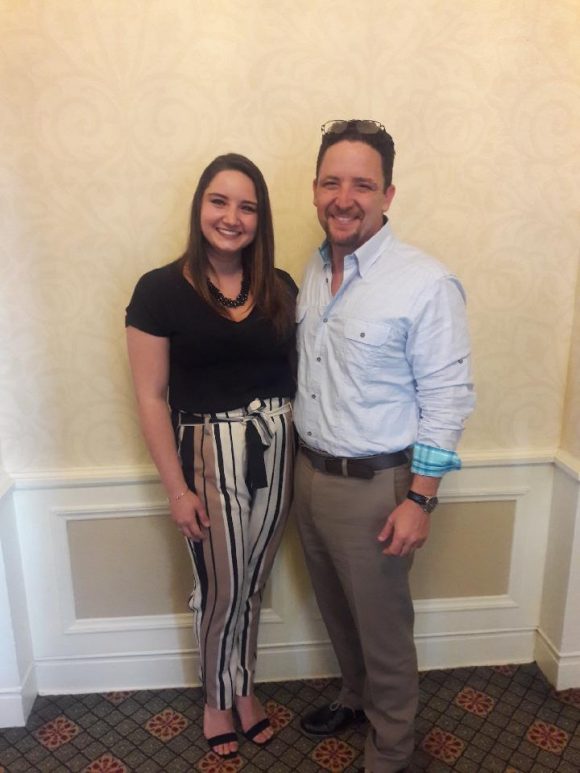
Utilizing your Intellectual Curiosity My Path to Undergraduate Research
July 11, 2018

Dr. Keith Weber (right) and Madison Murphy (left) at the ECA Convention Presentation
When intellectual curiosity meets persistence, anything is achievable. During Fall of my sophomore year, I enrolled in Research Methods with Dr. Keith Weber simply expecting a tough but practical class that I would soon forget; rather, that was the beginning of my love affair with the integration of statistics, theory, and experimentation into the single entity of ’communication’. Upon completion of the class which covers a variety of subsets of communication, Dr. Weber and I dove more deeply into Trait Communication research. Communication Apprehension, as defined by James McCroskey, is the “fear or anxiety associated with either real or perceived communication with another person or persons”. This is a core aspect of trait communication that any Chapman University School of Communication student could tell you, but despite the consistent use of the Communication Apprehension scale over the past nearly forty years, the greatest criticism of this subset is that there is little behavioral evidence to substantiate the theory. Thus, an idea was born. For the next several months we conducted our experiment and found significant results that proved the utility of the scale. After many hours of writing and calculations, we submitted our paper to the Eastern Communication Association for review. We were selected to serve on the Communication Trait panel at their annual convention as a top paper and the Spring of my Junior year- nerves and excitement rampant- I flew to Pittsburgh, Pennsylvania along with Dr. Weber and several other School of Communication faculty.
While serving on the panel as the speaker for our paper, I was able to present alongside three other researchers, including Dr. Andrew Rancer with Dr. Charles Wigley as a respondent. As the youngest on the panel, it was empowering to share findings alongside those prominent scholars in our field. Every class I had taken and the years of work put in to my Strategic and Corporate Communication degree had culminated in this single opportunity and I truly felt the value of my education and efforts. Inspiring is the theme I would use to describe the week I spent across the country, learning about the future I may come to hold. From attending panels with brilliant speakers, to exploring a new city with my professors, I saw what potential my education could have. The passion for the field of communication and determination to innovate and learn was present throughout the conference, and especially in the Chapman faculty.
Motivated by the possibilities in my future, I began my graduate school application- something I never would have considered an option before attending Chapman University. It is with excitement that I share my acceptance to the 4+1 Integrated Undergraduate/ Masters of Health and Strategic Communication this coming Fall. I look forward to continuing my research and utilizing the field of communication as a pathway to serving our world. As a first generation college student, I never imaged the opportunities this degree could offer and the mentorship that it would bring. The best advice I would give to current and future School of Communication students is to work hard, ask questions, get to know your professors, and above all, don’t give up. Your work matters, your education matters, and you can make a difference.

